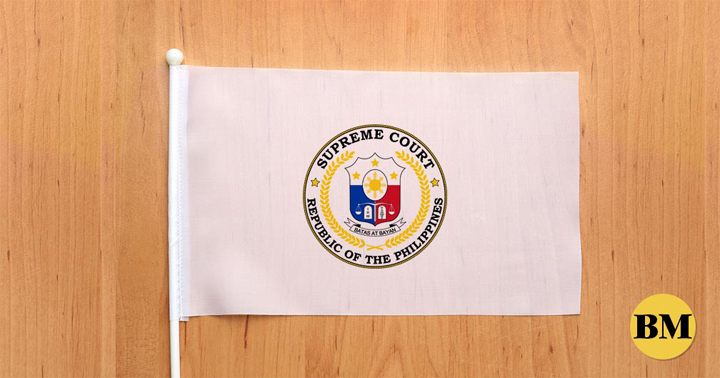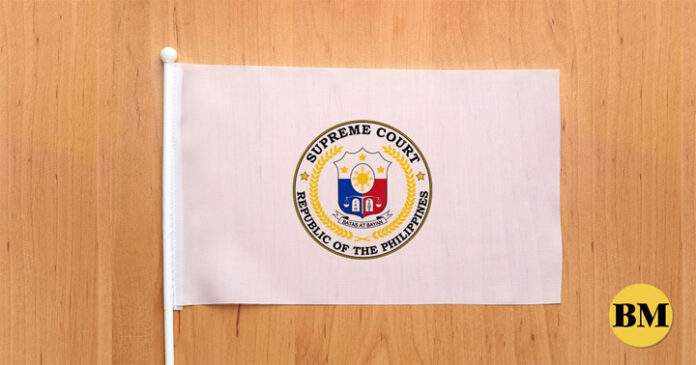
THE Supreme Court announced last Sunday the approval of new rules allowing bank inquiries and seizure of assets even before the filing of information relating to money laundering activities.
The High Tribunal said the recently-approved “The Court of Appeals Rule of Procedure in Cases of Bank Inquiry Into or Examination of Deposit and Investment Accounts Relating to an Unlawful Activity or a Money Laundering Offense Under Republic Act 9160, as Amended, or the Anti-Money Laundering Act of 2021,” will take effect starting May 31.
The Rule covers ex-parte applications for authority to inquire into, or examine, deposit or investment accounts with any banking institution or non-bank financial institution and their subsidiaries and affiliates, believed to be related to money laundering activities.
Under the rule, the Anti-Money Laundering Council (AMLC) through the Office of the Solicitor General (OSG) may file an ex parte application for bank inquiry before the CA when it has been established there is probable cause that the deposits or investments involved are related to an unlawful activity or a money laundering offense.
The application for bank inquiry should disclose the account number, or any other specific description of the deposit or investment accounts sought to be inquired into or examined, the owner or holder of the deposit or investment accounts, the address of the owner or holder, the name of the banking institution or non-bank financial institution where such account is maintained and their location.
The AMLC is also required under the rule to cite the ground relied upon for the grant of authority to inquire into or examine the deposit or investment account as well as the supporting evidence showing the existence of probable cause that the subject deposit of investment accounts are in any way related to an unlawful activity.
“All members of the CA Division to which the assigned Justice belongs shall resolve the ex parte application within 24 hours from its receipt,” the rule said.
According to the SC, a bank inquiry order issued by the CA should contain the deposit or investment account sought to be inquired into or examined, as well as the names of the account owners and/or holders.
The order should also direct the banking or non-bank financial institution concerned to allow the AMLC full access to all information, documents and objects relating to the subject deposit or investment account within a specific period of time.
The rule also prohibits officials and personnel of the said institutions from disclosing to the owners that their accounts are being inquired into.
The bank inquiry order issued by the CA is enforceable for 120 days, which may be extended for a period not exceeding 120 days upon motion of the AMLC.
Meanwhile, the SC announced that it has also approved the “Rule on Asset Preservation, Seizure and Forfeiture in Anti-Money Laundering Cases.” The rule allows the seizure of assets and properties even prior to the filing of an information.
The High Tribunal said the new rule recognizes the importance of preserving, seizing and forfeiting assets in preventing and restraining money laundering activities.
The rule allows the seizure of properties before or after the filing of a criminal information relating to money laundering offenses by virtue of a search warrant or warrantless arrest, and shall be disposed of in accordance with the Rules on Criminal Procedure.
However, the SC noted that if the property preserved is perishable or is disproportionately expensive to keep or store, it may be released from preservation upon deposit of an equivalent cash bond or sold in public auction. The proceeds from these shall be deposited with the clerk of court to be disposed of according to the final judgment of the court.
On the other hand, the SC said real estate property ordered preserved s should not be physically seized before a final order of forfeiture, nor shall its owners and occupants be evicted or deprived of its use and enjoyment.
The Court said the rule will also take effect Monday, May 31. The rule covers criminal cases before any court involving money laundering activities.
The rule further provides that the prosecution may move for asset forfeiture by making an allegation in the criminal information that it will proceed against the subject of the crime or offense, proceeds or fruits of the crime of offense, or any property used as the means of committing a crime.
“The rule provides that the State or prosecution may pursue the remedy of asset preservation for the court to issue and order an ex parte provisional asset preservation order, effective immediately for a period of 20 calendar days, upon determining the existence of probable cause to hold and conserve specific property and forbid any transaction, withdrawal, deposit, transfer, removal, conversion, concealment or other disposition thereof,” the SC said.
Prior to the approval of the rule, there were no clear-cut rules regarding the forfeiture or preservation of property related to unlawful activity or money laundering.
The SC had only promulgated the “Rule of Procedure in Cases of Civil Forfeiture, Asset Preservation and Freezing of Monetary Instrument, Property, or Proceeds Involving, or Relating to an Unlawful Activity or Money Laundering Offense Under RA 9160, effective December 15, 2005.”
The issuance of the new rule stemmed from the findings of the Asia-Pacific Group on Money Laundering in its October 2019 “Mutual Evaluation “Report on the Philippines that neither prosecutors nor law enforcement agencies have a policy or practice of seeking confiscation orders at the point of conviction.
In response, the SC created the Special Committee on the Proposed Rule on Criminal Confiscation and Forfeiture to make a report and recommendation for the issuance of rules on criminal confiscation and forfeiture.
Read full article on BusinessMirror

